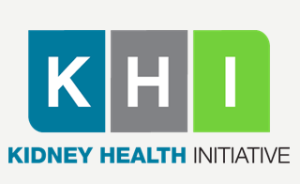Okay, so it’s not as exciting as “LIVE from New York, it’s Saturday Night,” but do you know about the Kidney Health Initiative (KHI)? In some respects, like Saturday Night Live with comedians, musicians, politicians, and actors, KHI is a collaboration among disparate groups. This week I attended the Third Annual KHI Stakeholders Meeting in Bethesda, MD, which brings together representatives from the U.S. Food and Drug Administration (FDA), academia, kidney patient groups, nephrology societies, and the nephrology industry. The 70 “members” of KHI are a diverse group from the American Association of Kidney Patients (AAKP) to the Society of Interventional Radiology.
KHI, a partnership between the American Society of Nephrology (ASN) and the FDA, was created to foster renal-disease-related clinical trials. Through improved research efforts, KHI is “dedicated to improving patient safety and promoting the development of the best possible therapies for diseases that affect the kidneys and quality of life for millions of people around the globe”. As articulated in the KHI Inaugural Review 2012-2014, this is the KHI mission:
“…to advance scientific understanding of the kidney health and patient safety implications of new and existing medical products, and to foster development of therapies for diseases that affect the kidney by creating a collaborative environment in which Food and Drug Administration (FDA) and the greater nephrology community can interact to optimize evaluation of drugs, devices, biologics, and food products.”
What is the landscape of nephrology clinical trials?
The 3 keynote speakers at last week’s Third Annual KHI Stakeholders Meeting opened the conference with an overview of the state of clinical trials in nephrology. Here are some highlights:
- Chronic diseases like CKD are hard to study since the serious events we are trying to prevent occur late in the long course of the disease
- Very long study times make it difficult and expensive to recruit patients and monitor them for years
- The FDA accepts some surrogate markers as substitutes for clinically meaningful endpoints. For example a doubling in serum creatinine, which does not make a patient feel bad, is a surrogate for reaching ESRD as a hard outcome
- The FDA does not accept modest changes in proteinuria as a surrogate outcome…yet
- Only 2.6% of current clinical trials are classified as nephrology trials and most of these are phase 1 or 2
- About 1/3 of current nephrology clinical trials are pre-ESRD, 1/3 are dialysis related, and the remaining trials are mostly divided among AKI, glomerular disease, and renal transplantation
- It is important to study patients early in the course of renal disease to prevent bad outcomes like ESRD, but many patients don’t know they have CKD early in the disease
Why are renal-related clinical trials few and far between?
CKD studies last a long time and are expensive. It is difficult to keep patients enrolled and actively participating when a study is active for years. In addition, patients who can or will participate over the long term may be a biased group, which makes the clinical trial outcomes hard to apply to the general renal patient population.
New FDA deputy commissioner for medical products and tobacco, Dr. Robert Califf, participated in the opening keynote address at the annual KHI meeting. Dr. Califf, a cardiologist, left his position as the director of Duke University’s Translational Medicine Institute to join the FDA in February. According to Dr. Califf, clinical trials are at a “tipping point” in large part due to electronic data capture, which enables collection and analysis of clinical and claims data. Patient-derived data from personal health devices like FitBits will further revolutionize the kind and amount of data gathered. The FDA is expecting to see approval requests for many more devices that are designed to meet patient needs and will use patient preference data in granting device approvals.
Big data enhances clinical research
Dr. Califf notes that big data in the real world will dramatically change clinical research opportunities. Health information exchange (HIE), electronic health records (EHRs), and robust government claims data can be combined to enhance data on patient outcomes. Medicare claims data combined with clinical data on 170 million Americans may identify more patients with diseases that are currently thought to be rare, and the globalization of personal health devices may enable clinical research on billions of people around the world.
As Dr. Califf pointed out, technology makes vast data collection possible, but the ethics of managing health data remains a constraining factor. The general public is studied and auto-randomized as we all use internet tools like Google. In the non-healthcare sector we are constant subjects for study and intervention based on our internet preferences, but medical research requires personal consent. Changes to the Federal Policy known as the “Common Rule,” which defines the protections required for human research in the U.S, may be proposed soon.
The public-private collaboration of KHI makes sense. The FDA is very interested in participating in activities like the KHI consortium, which creates a cooperative and transparent “eco-system” among academic research institutions, industry producers of drugs and devices, and the regulatory body that oversees approval of new products. The missing link is still CMS, the major payer. It is difficult to pursue innovation in devices, drugs, and models of care if Medicare and commercial insurers will not pay for them.
KHI has an active Patient and Family Partnership Council to provide patient input for research proposals and focus. This is especially important in the KHI pursuit of the “patient preferences concept,” which supports the development of patient reported outcomes (PROs) as valid research endpoints. For example, in a current KHI proposal focusing on treatment options for uremic pruritis where itching is a common symptom second only to fatigue and tiredness, all of the study endpoints are PROs and patient experience measures.
If you are interested in learning more about KHI, visit the website to view current projects and project proposals. KHI welcomes input from the industry, including nephrologists, other healthcare providers, and patients.
What is your experience with or thoughts on kidney disease research or KHI? We’d like to hear from you!
 Dugan Maddux, MD, FACP, is the Vice President for CKD Initiatives for FMC-NA. Before her foray into the business side of medicine, Dr. Maddux spent 18 years practicing nephrology in Danville, Virginia. During this time, she and her husband, Dr. Frank Maddux, developed a nephrology-focused Electronic Health Record. She and Frank also developed Voice Expeditions, which features the Nephrology Oral History project, a collection of interviews of the early dialysis pioneers.
Dugan Maddux, MD, FACP, is the Vice President for CKD Initiatives for FMC-NA. Before her foray into the business side of medicine, Dr. Maddux spent 18 years practicing nephrology in Danville, Virginia. During this time, she and her husband, Dr. Frank Maddux, developed a nephrology-focused Electronic Health Record. She and Frank also developed Voice Expeditions, which features the Nephrology Oral History project, a collection of interviews of the early dialysis pioneers.





Leave a Reply